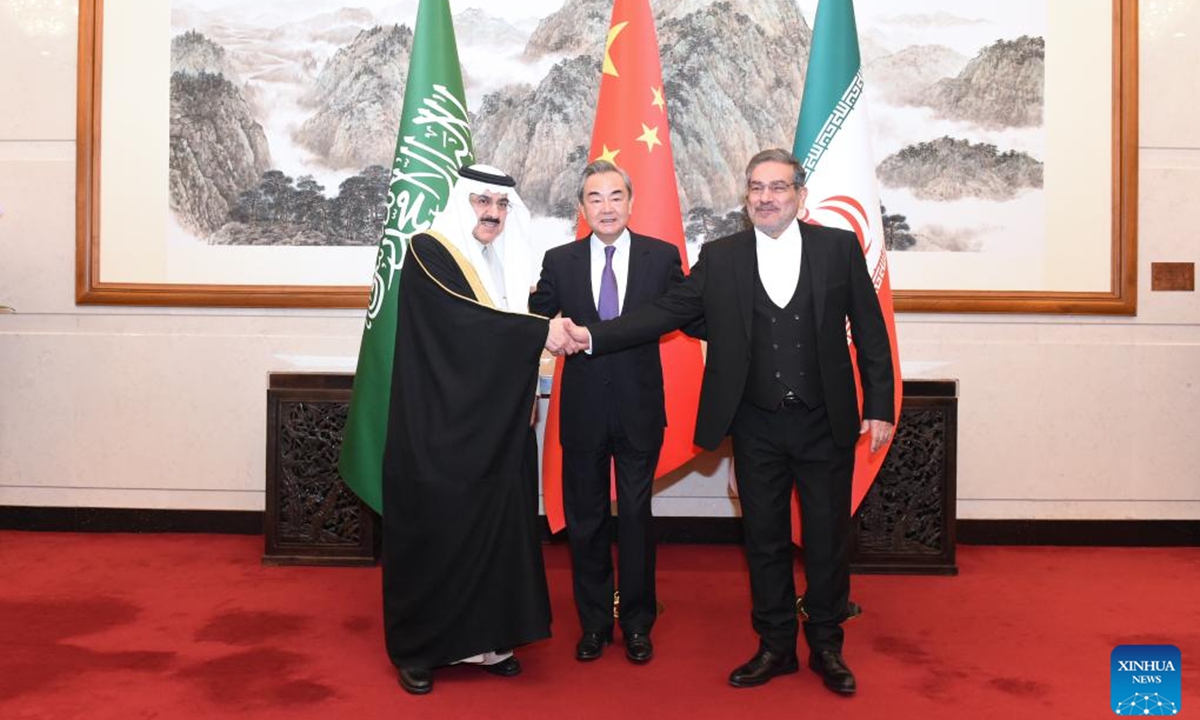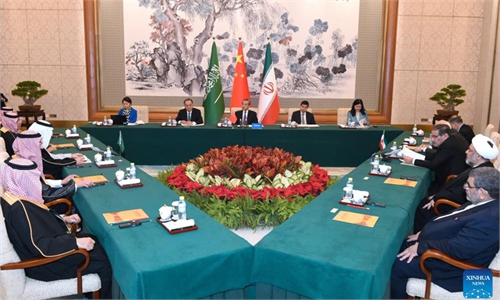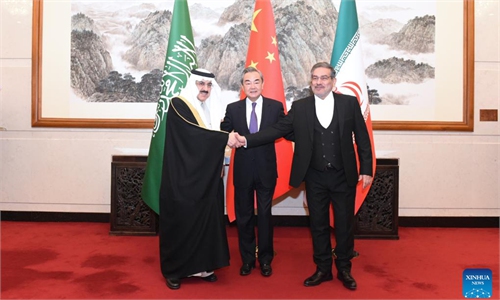China can play peacemaker while US cannot

Wang Yi (C), a member of the Political Bureau of the Communist Party of China (CPC) Central Committee and director of the Office of the Foreign Affairs Commission of the CPC Central Committee
The two arch-rivals of the Middle East - Saudi Arabia and Iran - recently sat down for peace talks in Beijing and restored diplomatic relations, highlighting the effectiveness of China's diplomatic efforts.Why can China act as the "peace broker?"
On the one hand, China has never supported one side to fight another, nor has it "stirred up the water" in the Middle East for its own interests. On the other, the Middle East's development is becoming more closely linked to China's.
Of course, the most important reason is that the global "political identity" of China, as a developing power, has become more prominent. China adheres to a policy of non-alignment, never engages in aggression, plunder or claims hegemony, which stands in stark contrast to other major powers.
Some US experts say that their country has given China the opportunity to be the "peacemaker" this time. I want to ask, can the US be such a "peacemaker?"
The Washington Post quoted Trita Parsi, executive vice president of the Quincy Institute for Responsible Statecraft, saying, "Unfortunately, the US has adopted an approach to the region that has disabled it from becoming a credible mediator."
This is an excellent example showing that as the US and Europe, along with their military tool NATO, insist on defining the security boundaries through the expansion of a military alliance, this has ultimately lead to the change of their political identity, in the eyes of the world.
When the US and NATO speak of their own security, why can't they think about the security of those countries that won't align with them, particularly those who don't have the same political system, ideology, and religion as theirs?
We do not deny that the Russia-Ukraine conflict is about the basic principle of the United Nations, that is, preserving the territorial integrity of sovereign states is a must. But what is more important is that this conflict means that Europe has once again fallen into a battle for spheres of influence. The struggle for spheres of power and security led to two world wars.
Therefore, this war leaves us a question of who wins and who loses, but whether it will keep Europe and even the world, mired in the scramble for spheres of influence of great powers, remains to be seen, which would mean no sustainable global peace.
That is why China has always stressed the need to look at things historically.
The common concern of China and many other countries not supporting either side in the Russia-Ukraine war is whether this scramble will extend to their regions and whether all countries will have to follow the US and European spheres of influence to be safe.
This fear is not without reason. The US is now ganging up around China's periphery, building military alliances against China, and NATO has even jumped in and tried to set a sphere of influence that targets China's rise.
Washington sees Beijing as a main force undermining the security of the US and its allies. It fabricates rumors that China is going to ally with Russia against the US. This is an imagination based on the logic of the US' hegemony.
Therefore, to stop the Russia-Ukraine conflict, first of all, all sides must abide by the basic principle of the United Nations - respecting the sovereign integrity of all countries. At the same time, to achieve lasting peace, the US and Europe must abandon their global spheres of influence expansion with NATO as a tool and stop forcing more countries around the world to draw lines according to the ideology of the West.
Breaking the framework of spheres of influence requires the participation of more neutral countries, such as China, India, Brazil, South Africa, Indonesia and so on. These countries are the key drivers of change, and China is a part of that.
The fact that China can be a peacemaker reflects the kind of peace that more countries around the world are looking for.
The author is a senior editor with People's Daily, and currently a senior fellow with the Chongyang Institute for Financial Studies at Renmin University of China. dinggang@globaltimes.com.cn. Follow him on Twitter @dinggangchina



